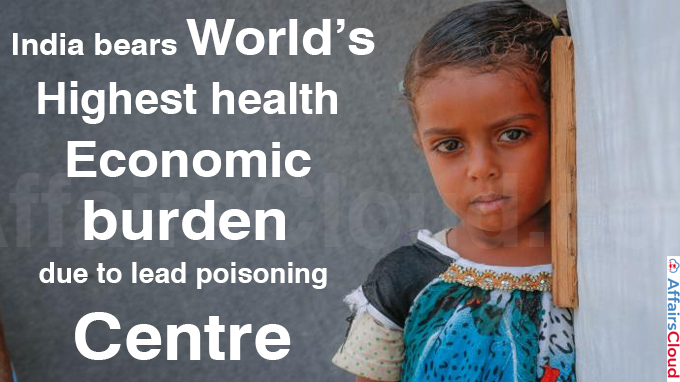
NITI Aayog (National Institution for Transforming India) and the Council of Scientific & Industrial Research (CSIR), have jointly prepared a report “Assessment of Lead Impact on Human and India’s Response”, in July 2022, which found that India bears the world’s highest health and economic burden due to lead poisoning.
- The Energy and Resource Institute (TERI) and Pure Earth, an International non-profit organisation, co-hosted a seminar on “Understanding Lead Poisoning Prevalence in India” in New Delhi, Delhi to discuss the need for urgent responses at both the national and state levels to tackle global health crisis triggered by lead poisoning, particularly in India.
- The meeting was organised to discuss the findings of the report prepared by NITI Aayog and CSIR.
Note: The Report of NITI Aayog and CSIR was prepared by reviewing the data of the report “The Toxic Truth: Children’s Exposure to Lead Pollution Undermines a Generation of Future Potential” jointly produced by United Nations Children’s Fund (UNICEF) and Pure Earth.
From the report:
i.In India, the prevalence of lead poisoning is in 23 states with people having an average Blood Lead Level (BLL) that exceeds 5 microgram per decilitre (μg/dl) and 4.9 μg/dl for children less than two years old.
- Among 23 states, Bihar, Uttar Pradesh, Madhya Pradesh, Jharkhand, Chhattisgarh and Andhra Pradesh have the highest average BLL with more than 7 μg/dL.
- These states account for 40% of India’s population that are with poor health indicators.
ii.India loses USD 236 billion in GDP per year, approximately 5% of economic growth, due to lead poisoning in children.
India’s exposure to lead:
i.India accounts for 26% of global deaths due to lead exposure every year and 50 percent of children are with elevated blood lead levels (BLL) globally.
ii.In India, lead is found in adulterated spices, cookware, paint, traditional medicines, cosmetics and in the recycling of lead-acid batteries.
iii.Lead poisoning in children will eventually result in hampered brain development, damage to the central nervous system, which in turn has an impact towards loss of intelligence up to 5 Intelligence Quotient (IQ) points, attention deficit disorders and lower education attainment.
Key Points:
i.CSIR and Niti Ayog assessed 89 data sets from 36 studies carried out between 1970 and 2014 to corroborate the findings of the UNICEF report.
ii.The CSIR and Niti Aayog report details the effective ways to reduce negative impacts of lead poisoning and it also lists the national and state-level steps.
iii.This includes identifying at-risk populations through BLL monitoring, investigating sources of elevated BLLs and healthcare workforce training to sensitise them to monitor, detect and treat lead poisoning.
iv.A fourth step is to undertake targeted research and intervention studies to identify potential new sources that can be addressed by the policymakers and the scientific community.
About Pure Earth:
Pure Earth is an international nonprofit organisation that are dedicated to solving toxic pollution problems and improving lives in low- and middle-income countries.
President – Richard Fuller
Global Headquarters – New York, United States (US)
India Headquarters – New Delhi, Delhi
Establishment – 1999




